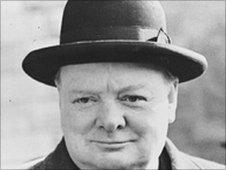Churchill changed 'finest' speech in World War II
- Published

Winston Churchill's papers are covered in annotations, researchers found
Winston Churchill made last-minute changes to a "colossal" speech during World War II, according to research carried out in Cambridge.
The Prime Minister spoke of Britain's "finest hour" when he addressed the nation on 18 June 1940.
An examination of papers held at Cambridge University has revealed the work he put in to early drafts.
He also made revisions in the last moments before delivery, researchers discovered.
The Churchill Archives Centre has looked at the papers ahead of the 70th anniversary of the Battle of Britain.
Care and attention
Speaking about the first draft, archives director Allen Packwood said: "The page is covered with his handwritten annotations in red and blue ink.
"It highlights how much care and attention Churchill put into this speech.
"He knew how much was riding on this. The country was facing a huge national crisis. France had capitulated and Britain was facing the prospect of attack and invasion."
Historian Max Arthur said: "This is a colossal speech, the way he's evolved it, thought it through, realising more than any other Prime Minister before him just what impact this would have on the nation."
Mr Packwood said annotations written over the typed speech shows Churchill was reworking the wording up until the point of delivery.
"You can imagine him sitting on the front bench of the House of Commons spotting an error and making a quick change," he said.
Churchill wrote "all shall be restored" after a typed sentence about the Battle of Britain being about to begin.
Mr Packwood added: "I think there is a big danger in this day and age of Churchill assuming a purely iconic status.
"What you can see here is his self-belief, his determination, his humanity, that leads us on from the dark days of 1940 to final victory in 1945.
"There's nothing quite like seeing the piece of paper that Churchill signed or the page that Churchill had in his hand when he delivered that amazing climax to his finest hour speech."